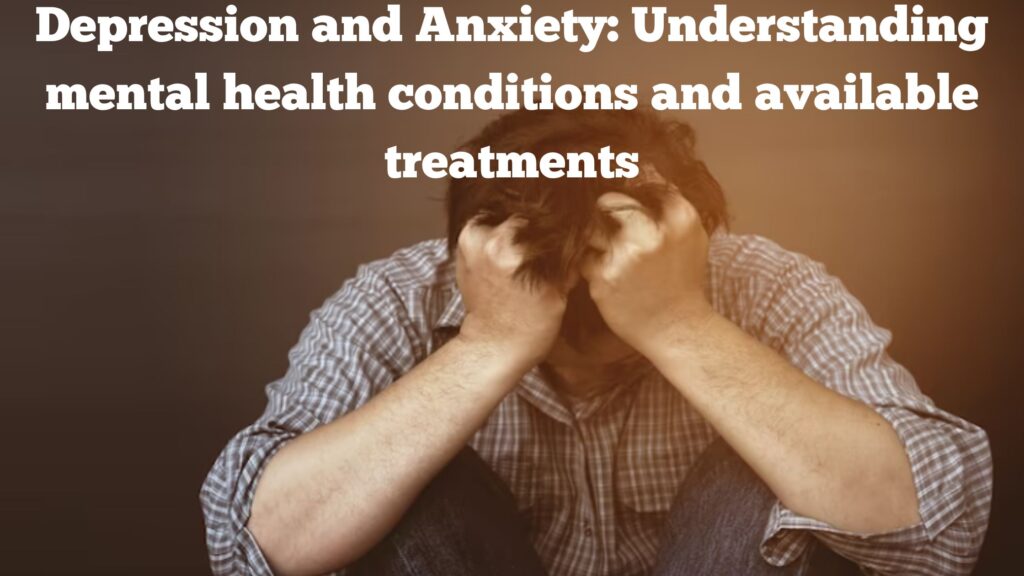Depression and anxiety are two of the most common mental health conditions worldwide. According to the World Health Organization, depression affects more than 264 million people globally, and anxiety disorders affect more than 284 million people. These conditions can significantly impact a person’s quality of life, making it challenging to function on a daily basis. Fortunately, there are several available treatments that can help individuals manage and overcome depression and anxiety. In this blog, we will discuss the causes, symptoms, and available treatments for these mental health conditions.
What is Depression?

Depression is a mental health condition that causes a persistent feeling of sadness and loss of interest in activities that a person once enjoyed. The symptoms of depression can vary from person to person, but some common symptoms include:
- Feeling sad, empty, or hopeless most of the day, nearly every day
- Loss of interest in activities or hobbies that once brought pleasure
- Changes in appetite and weight
- Difficulty sleeping or sleeping too much
- Fatigue or loss of energy
- Feelings of worthlessness or guilt
- Difficulty concentrating or making decisions
- Thoughts of death or suicide
The causes of depression are not fully understood, but it is believed that a combination of genetic, biological, environmental, and psychological factors can contribute to the development of this condition. Some risk factors for depression include:
- Family history of depression
- Trauma or stressful life events
- Chronic illness or pain
- Substance abuse or addiction
- Certain medications
- Hormonal changes
What is Anxiety?
Anxiety is a mental health condition that causes intense feelings of worry, fear, or apprehension. Anxiety can be a normal and healthy response to stress, but when it becomes excessive or persistent, it can interfere with daily life. The symptoms of anxiety can vary, but some common symptoms include:
- Excessive worry or fear
- Restlessness or feeling on edge
- Muscle tension
- Difficulty sleeping or staying asleep
- Irritability
- Difficulty concentrating
- Rapid heartbeat or shortness of breath
- Sweating or trembling
- Panic attacks
Like depression, the causes of anxiety are not fully understood. However, it is believed that a combination of genetic, biological, environmental, and psychological factors can contribute to the development of this condition. Some risk factors for anxiety include:
- Family history of anxiety or other mental health conditions
- Trauma or stressful life events
- Chronic illness or pain
- Substance abuse or addiction
- Certain medications
- Hormonal changes
Available Treatments for Depression and Anxiety:
There are several available treatments for depression and anxiety, and it is essential to seek professional help to determine which treatment may be most effective for you. Some common treatments for depression and anxiety include:
Medications:
Antidepressants and anti-anxiety medications are commonly prescribed to treat depression and anxiety. These medications can help regulate brain chemistry and improve symptoms. It is essential to work closely with a healthcare provider to determine which medication may be most effective for you and to monitor any potential side effects.
Psychotherapy:
Psychotherapy, also known as talk therapy, is a type of counseling that involves talking with a mental health professional. Psychotherapy can help individuals with depression and anxiety identify and address underlying issues that may be contributing to their symptoms. There are several types of psychotherapy, including cognitive-behavioral therapy, which focuses on changing negative thought patterns, and interpersonal therapy, which focuses on improving relationships.
Lifestyle Changes:
Lifestyle changes can also be effective in managing depression and anxiety. Some common lifestyle changes that can improve symptoms include:
- Regular exercise: Exercise can improve mood and reduce symptoms of depression and anxiety.
- Healthy diet: A healthy diet can improve overall health and mood.
- Getting enough sleep: Sleep is essential

